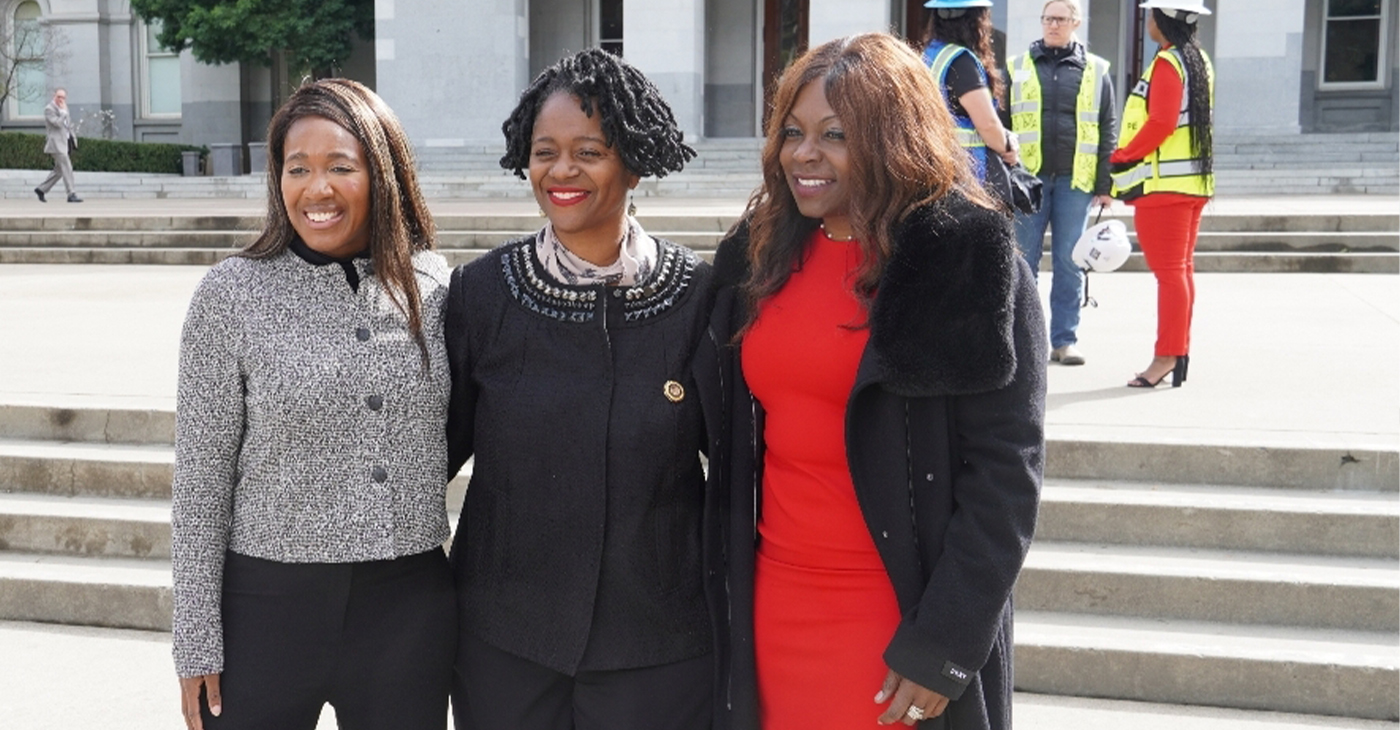National
Murder Indictment for Officer Who Shot Fleeing Black Man

Walter Scott’s parents, Judy Scott and Walter Scott Sr., gather with attorneys for Scott family outside the Charleston County Courthouse, Monday, June 8, 2015, after a Charleston County grand jury handed down an indictment for murder against North Charleston Police Officer Michael Slager in the April 4 shooting death of Walter Scott in Charleston, S.C. Slager fatally shot Scott, who was unarmed, as he was trying to run from a traffic stop. (Grace Beahm/The Post and Courier via AP)
BRUCE SMITH, Associated Press
CHARLESTON, S.C. (AP) — It didn’t take long for a grand jury in South Carolina to indict a white former city policeman for murder in the shooting death of a black man who tried to flee from a traffic stop.
State investigators presented the case against former North Charleston officer Michael Slager to a Charleston County grand jury on Monday and prosecutor Scarlett Wilson announced the indictment a few hours later.
A bystander’s cellphone video shows Slager firing eight times as 50-year-old Walter Scott tried to run away on April 4. The killing enflamed a national debate about how black people are treated by white police officers.
But it caused no unrest in North Charleston, where community leaders and Scott’s family praised the government’s swift response. Slager was charged with murder by state law enforcement agents and fired from the police force immediately after Scott’s family released the video.
The indictment of Slager is the fourth in less than six months in which a grand jury in South Carolina has agreed that white officers should stand trial in the shootings of black men.
The grand jury that reviewed the shooting of Michael Brown by officer Darren Wilson in Ferguson, Missouri, met weekly for three months, hearing from 60 witnesses. Saint Louis County Prosecuting Attorney Bob McCulloch then spoke nearly 45 minutes, describing how jurors “poured their hearts and souls into this process” before deciding not to indict anyone in Brown’s death. Angry protests and riots ensued.
When riots in Baltimore followed the death in police custody of another young black man, Freddie Gray, State’s Attorney Marilyn Mosby charged six officers with crimes and then spent two weeks presenting evidence to a grand jury that affirmed nearly all the charges. “To the youth of this city, I will seek justice on your behalf. This is a moment. This is your moment,” Mosby said in a passionate speech.
Wilson, by contrast, made no speeches. She called reporters to her office to announce the indictment, and made very few comments.
Asked about the importance of the cellphone video of Scott’s death, she acknowledged that it’s helpful to have evidence that “depicts the crime, and we aren’t having to rely just on people’s perceptions.”
That said, “just because you have video in a case doesn’t mean it’s the be-all and end-all and the case is over,” she said. “The jury will be able to make up their own mind after seeing the video and hearing the testimony.”
Slager said he initially tried to stun Scott with his Taser when both men scuffled over the stun gun and he fired his handgun at Scott in self-defense. The video shows the men briefly scuffling before Scott runs away and the officer fires at Scott’s back.
Slager, 33, faces 30 years to life without parole if convicted. Wilson said the death penalty doesn’t apply because there are no aggravating circumstances such as robbery or kidnapping.
His defense lawyer, Andy Savage, said he won’t comment “until we have an opportunity to fully evaluate the state’s case and to compare it with our own investigation.”
Walter Scott’s brother Rodney Scott said the family is “very happy and pleased” with the indictment.
“This is just an example of if you keep the faith, even in the darkest times, you will see the light,” said Chris Stewart, a lawyer for Scott’s family who is preparing to file wrongful death civil suit against the city.
“We are going to patiently wait for the criminal trial in this case and we are going to patiently wait to see if the city, the police department and the chief are going to take responsibility in the civil suit,” Stewart added.
Copyright 2015 The Associated Press. All rights reserved. This material may not be published, broadcast, rewritten or redistributed.
Activism
Oakland Post: Week of March 28 – April 1, 2025
The printed Weekly Edition of the Oakland Post: Week of March 28 – April 1, 2025

To enlarge your view of this issue, use the slider, magnifying glass icon or full page icon in the lower right corner of the browser window.
Activism
Sen. Lola Smallwood-Cuevas Honors California Women in Construction with State Proclamation, Policy Ideas
“Women play an important role in building our communities, yet they remain vastly underrepresented in the construction industry,” Smallwood-Cuevas stated. “This resolution not only recognizes their incredible contributions but also the need to break barriers — like gender discrimination.

By Antonio Ray Harvey, California Black Media
To honor Women in Construction Week, Sen. Lola Smallwood-Cuevas (D-Los Angeles), a member of the California Legislative Black Caucus (CLBC), introduced Senate Concurrent Resolution (SCR) 30 in the State Legislature on March 6. This resolution pays tribute to women and highlights their contributions to the building industry.
The measure designates March 2, 2025, to March 8, 2025, as Women in Construction Week in California. It passed 34-0 on the Senate floor.
“Women play an important role in building our communities, yet they remain vastly underrepresented in the construction industry,” Smallwood-Cuevas stated. “This resolution not only recognizes their incredible contributions but also the need to break barriers — like gender discrimination.
Authored by Assemblymember Liz Ortega (D-San Leandro), another bill, Assembly Concurrent Resolution (ACR) 28, also recognized women in the construction industry.
The resolution advanced out of the Assembly Committee on Rules with a 10-0 vote.
The weeklong event coincides with the National Association of Women In Construction (NAWIC) celebration that started in 1998 and has grown and expanded every year since.
The same week in front of the State Capitol, Smallwood, Lt. Gov. Eleni Kounalakis, Assemblymember Josh Hoover (R-Folsom), and Assemblymember Maggie Krell (D-Sacramento), attended a brunch organized by a local chapter of NAWIC.
Two of the guest speakers were Dr. Giovanna Brasfield, CEO of Los Angeles-based Brasfield and Associates, and Jennifer Todd, President and Founder of LMS General Contractors.
Todd is the youngest Black woman to receive a California’s Contractors State License Board (A) General Engineering license. An advocate for women of different backgrounds, Todd she said she has been a woman in construction for the last 16 years despite going through some trying times.
A graduate of Arizona State University’s’ Sandra Day O’Connor College of Law, in 2009 Todd created an apprenticeship training program, A Greener Tomorrow, designed toward the advancement of unemployed and underemployed people of color.
“I always say, ‘I love an industry that doesn’t love me back,’” Todd said. “Being young, female and minority, I am often in spaces where people don’t look like me, they don’t reflect my values, they don’t reflect my experiences, and I so persevere in spite of it all.”
According to the U.S. Bureau of Labor Statistics, only 11.2% of the construction workforce across the country are female. Overall, 87.3% of the female construction workers are White, 35.1% are Latinas, 2.1% are Asians, and 6.5% are Black women, the report reveals.
The National Association of Home Builders reported that as of 2022, the states with the largest number of women working in construction were Texas (137,000), California (135,000) and Florida (119,000). The three states alone represent 30% of all women employed in the industry.
Sen. Susan Rubio (D-Baldwin Park) and the California Legislative Women’s Caucus supported Smallwood-Cuevas’ SCR 30 and requested that more energy be poured into bringing awareness to the severe gender gap in the construction field.
“The construction trade are a proven path to a solid career. and we have an ongoing shortage, and this is a time for us to do better breaking down the barriers to help the people get into this sector,” Rubio said.
Activism
Report Offers Policies, Ideas to Improve the Workplace Experiences of Black Women in California
The “Invisible Labor, Visible Struggles: The Intersection of Race, Gender, and Workplace Equity for Black Women in California” report by the California Black Women’s Collective Empowerment Institute (CBWCEI), unveiled the findings of a December 2024 survey of 452 employed Black women across the Golden State. Three-fifths of the participants said they experienced racism or discrimination last year and 57% of the unfair treatment was related to incidents at work.

By McKenzie Jackson, California Black Media
Backed by data, a report released last month details the numerous hurdles Black women in the Golden State must overcome to effectively contribute and succeed in the workplace.
The “Invisible Labor, Visible Struggles: The Intersection of Race, Gender, and Workplace Equity for Black Women in California” report by the California Black Women’s Collective Empowerment Institute (CBWCEI), unveiled the findings of a December 2024 survey of 452 employed Black women across the Golden State. Three-fifths of the participants said they experienced racism or discrimination last year and 57% of the unfair treatment was related to incidents at work.
CBWCEI President and CEO Kellie Todd Griffin said Black women have been the backbone of communities, industries, and movements but are still overlooked, underpaid, and undervalued at work.
“The data is clear,” she explained. “Systemic racism and sexism are not just historical injustices. They are active forces shaping the workplace experiences of Black women today. This report is a call to action. it demands intentional polices, corporate accountability, and systemic changes.”
The 16-page study, conducted by the public opinion research and strategic consulting firm EVITARUS, showcases the lived workplace experiences of Black women, many who say they are stuck in the crosshairs of discrimination based on gender and race which hinders their work opportunities, advancements, and aspirations, according to the report’s authors, Todd Griffin and CBWCEI researcher Dr. Sharon Uche.
“We wanted to look at how Black women are experiencing the workplace where there are systematic barriers,” Todd Griffin told the media during a press conference co-hosted by Ethnic Media Services and California Black Media. “This report is focused on the invisible labor struggles of Black women throughout California.”
The aspects of the workplace most important to Black women, according to those surveyed, are salary or wage, benefits, and job security.
However, only 21% of the survey’s respondents felt they had strong chances for career advancement into the executive or senior leadership ranks in California’s job market; 49% felt passed over, excluded from, or marginalized at work; and 48% felt their accomplishments at work were undervalued. Thirty-eight percent said they had been thought of as the stereotypical “angry Black woman” at work, and 42% said workplace racism or discrimination effected their physical or mental health.
“These sentiments play a factor in contributing to a workplace that is unsafe and not equitable for Black women in California,” the report reads.
Most Black women said providing for their families and personal fulfillment motivated them to show up to work daily, while 38% said they were dissatisfied in their current job with salary, supervisors, and work environment being the top sources of their discontent.
When asked if they agree or disagree with a statement about their workplace 58% of Black women said they feel supported at work, while 52% said their contributions are acknowledged. Forty-nine percent said they felt empowered.
Uche said Black women are paid $54,000 annually on average — including Black single mothers, who averaged $50,000 — while White men earn an average of $90,000 each year.
“More than half of Black families in California are led by single Black women,” said Uche, who added that the pay gap between Black women and White men isn’t forecasted to close until 2121.
-

 Activism4 weeks ago
Activism4 weeks agoUndocumented Workers Are Struggling to Feed Themselves. Slashed Budgets and New Immigration Policies Bring Fresh Challenges
-

 Activism1 week ago
Activism1 week agoWe Fought on Opposite Sides of the Sheng Thao Recall. Here’s Why We’re Uniting Behind Barbara Lee for Oakland Mayor
-

 Activism4 weeks ago
Activism4 weeks agoOakland Post: Week of March 5 – 11, 2025
-

 #NNPA BlackPress2 weeks ago
#NNPA BlackPress2 weeks agoRev. Dr. Jamal Bryant’s Black Church Target Boycott Mobilizes 150,000
-

 Activism2 weeks ago
Activism2 weeks agoSan Francisco Is Investing Millions to Address Food Insecurity. Is Oakland Doing the Same?
-

 #NNPA BlackPress4 weeks ago
#NNPA BlackPress4 weeks agoTrump Moves to Dismantle Education Department
-

 #NNPA BlackPress4 weeks ago
#NNPA BlackPress4 weeks agoFighting to Keep Blackness
-

 #NNPA BlackPress2 weeks ago
#NNPA BlackPress2 weeks agoRecently Approved Budget Plan Favors Wealthy, Slashes Aid to Low-Income Americans
























































